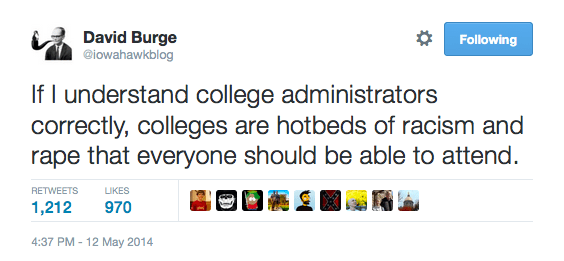ASHE SCHOW: College spokesman says rape didn’t happen, loses his job.
A spokesman for Hocking College has been fired for telling media outlets that a reported rape did not actually occur.
Investigations from the Athens County prosecutor’s office as well as the school’s Title IX office both determined that the alleged rape did not occur.
A female student reported to police on Sept. 1 that she had been gang-raped by several male students several days earlier, on Aug. 27. She claimed she had gone to a party and consumed a lot of alcohol. She said she didn’t remember returning to her dorm, but somehow she did and couldn’t find her keys, so she asked several other students to help her get into the building.
She then said she woke up hours later, naked, with five naked men. The school’s counseling center had referred her to the school’s advocacy center, which referred her to the college police. Now, more than a month later, the prosecutor’s office is concluding its investigation without charging any of the accused men.
“After pursuing all leads and following all investigatory protocols, the Athens County Prosecutor’s Office determined there was no evidence to pursue an indictment in rape allegations against five Hocking College students,” the release states.
The school also closed its own investigation into the claim, even as national attention puts intense pressure on colleges and universities to steamroll ahead with accusations, often without much evidence.
“Investigators at Hocking College did not find enough evidence to support a Title IX violation,” the school’s president said in a statement.
Yet the spokesman, Michael Brown, has been fired.
Related: When evidence is allowed, Stanford changes its verdict on an alleged campus sexual assault.
In 2013, Elise Clougherty accused her ex-boyfriend of a year, Joe Lonsdale, of abuse and sexual assault. She reported her allegations to Stanford University, where she was a student and he was her mentor. Stanford found Lonsdale responsible for sexual assault and banned him from the campus for 10 years.
In early November 2015, Stanford reversed the ban, citing “new evidence” in the case.
That “new evidence” was apparently emails sent from Clougherty to Lonsdale during their relationship that raised doubts about her accusations. The emails were not included in the original investigation against Lonsdale, and were only brought to the attention of Stanford administrators due to a New York Times article about the case.
Also: Third lawsuit filed against Rolling Stone for gang-rape hoax.

